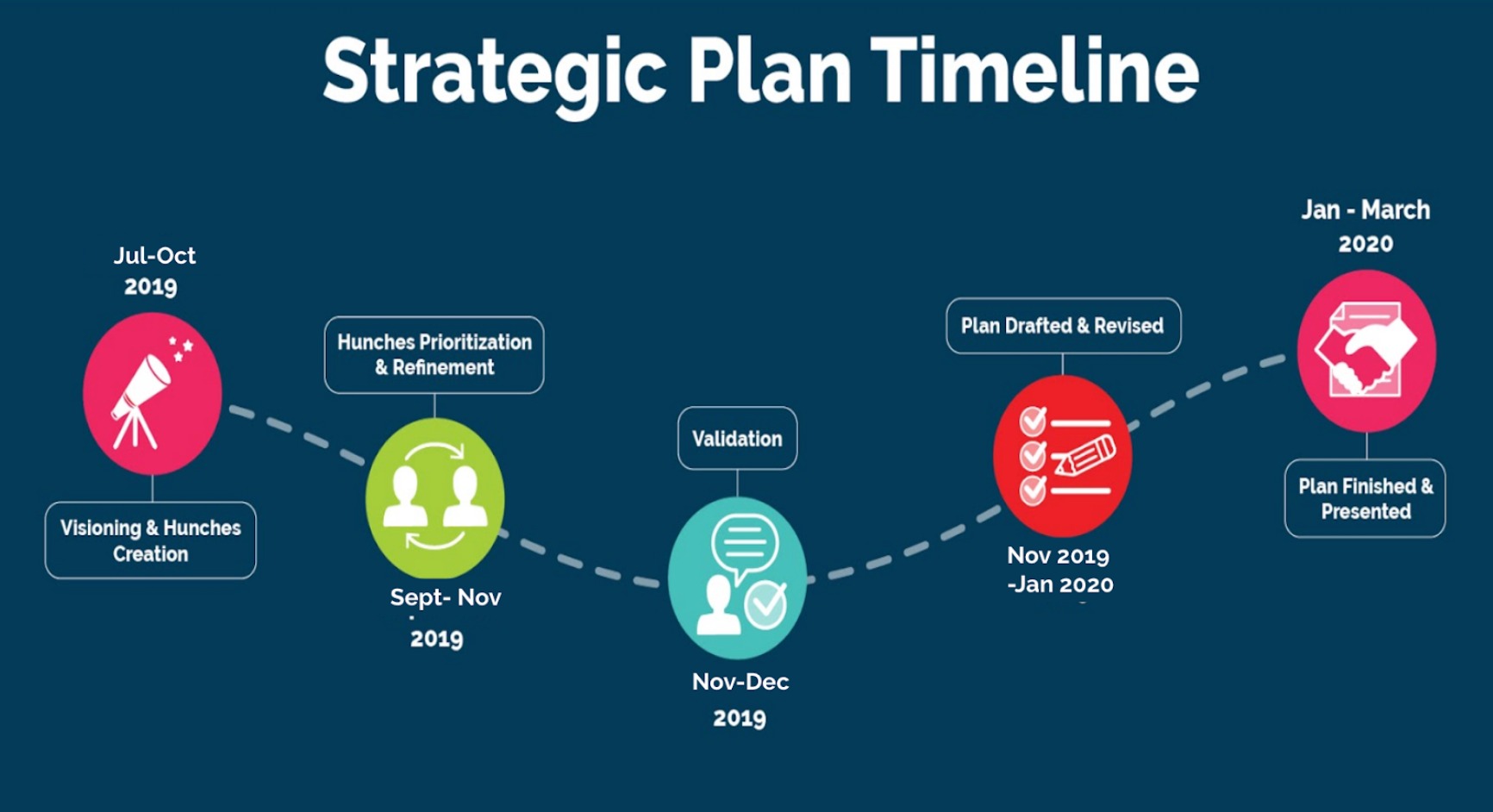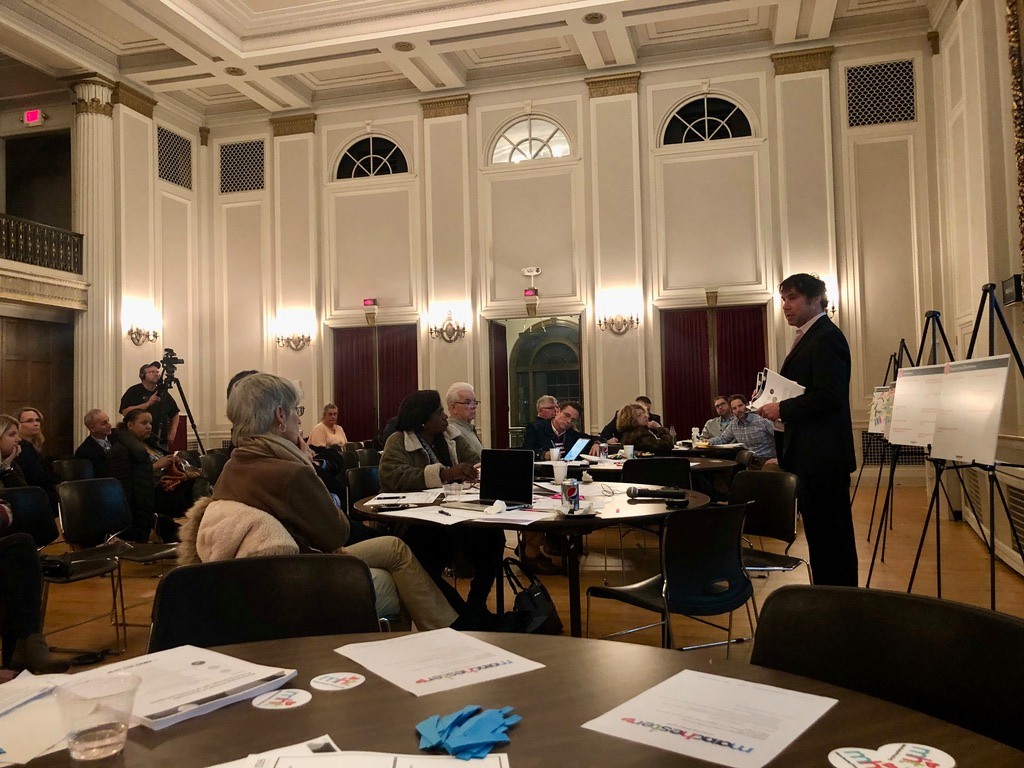
MANCHESTER, NH — Manchester Proud and its partner 2Revolutions held a 2½-hour session Nov. 18 with current and new Board of School Committee members at the Institute of Art and Design at New England College to share early ideas for remodeling education in Manchester and to hear their ideas. This was the second in a series of planned workshop/presentations. According to a timeline provided, the finalized plan should be ready in Q1 of 2020.
The nearly 50 ideas in draft form provided to committee members were developed and prioritized by Manchester Proud’s Community Planning Group. The list won’t be finalized until January after feedback and input from the school committee and community members have been incorporated.

The workshop was an opportunity for current and newly-elected school committee members to share their feedback. There will be three similar sessions for the public, on Dec. 3, 12, and 18, from 6 to 8 p.m. once locations have been confirmed.
During the presentation, 2Revolutions shared the 50+ page document of ideas, which are divided into five categories:
- Teaching and Learning
- Finance
- Governance
- Organizational Effectiveness
- Community Partnerships
School committee members shared impressions with one another, asked for more information as needed, and then identified their top choices in each category.
“It was inspiring to see our school board members collaborating and prioritizing essential needs to better the Manchester School District,” said Kimiya Parker-Hill, a senior at Manchester West High School and a member of our Community Planning Group. “Their input is crucial to the success of the community’s final plan.”
In addition to Board of School Committee members, members of the public, as well as Manchester Proud’s Champions Council and Community Planning Group, attended the session held at the Institute of Art and Design at New England College in Manchester.
2Revolutions’ slide presentation is available below, as well as the draft ideas shared with school committee members. The cost, difficulty, potential impact, and potential risk is noted for each, as is whether the suggestion would require a change in school district policy.
The full report is easy to read and provides a lot of information and insight, and is recommended reading for anyone interested in the future of the school district.

Some highlights from the document:
- Community engagement/finance: Setting up a separate foundation and/or alumni foundations to support specific needs within the district. Such foundations exist in other NH school districts, including Bedford.
- Student Outcomes: Implement a tracking system for ABC data (attendance, behavior, course completion) which are among the strongest indicators for on-time graduation.
- Decentralize information dissemination with community partner hubs to reach more people/families where they are.
- Scale a mentorship program so that each high school student has access to and guidance about future career options and pathways.
- Magnet Schools – Given the success of Machester School of Technology and the redesign work at West, and a pedagogic move in the district to more experiential, project-based learning, exploring how greater choice and specialization for students within the district can improve outcomes seems a worthwhile endeavor.
- Revenue through education: For example, expansion of a revenue-generating program at MST could attract and host an additional 50 students, that would yield an additional $250,000 in revenue; an additional
250 students would yield $1.25 million in revenue. - Student-based budgeting: Allow funding to “follow the student” to schools, by reviewing school-level resource utilization and linking it to academic and financial planning more concretely. Student-Based Budgeting has become a popular initiative for district leaders who seek to allocate scarce resources to schools, especially in the face of stubborn achievement gaps, changing and complex demographics and shrinking federal and state support.
- Early identification process for special education: Targeted professional development for educators in Pre-K through grade 3 around special education identification will help to expand the knowledge and understanding of educators around special education identification. This will better support learners and help combat the rising cost of overidentifying students.
- Adjust teacher placement to need and initiate hiring freeze: Analyze staffing capacity and adjust staffing levels based on enrollment and student needs consistently across the district. Do an equity review of staffing levels across grade bands and schools, and freeze hiring until teaching force is in alignment with needs.
- Assess possible mixed-use of open building space: Ways to maximize and monetize buildings for use by higher education programs or preschool, for example.
- Redirect the Board of School Committee toward policy: Reign in public antics and improve perception of the board through alignment with “8 Characteristics of an Effective School Board” and redefine leadership qualities and expectations.
- Consider charter changes to number of BOSC members and how they are elected: This could reduce the politicization of school committee elections and
- Allow an elected student seat on board with some voting rights
- Increase meeting efficiencies for shorter more focused sessions
- Eliminate mayoral chairmanship of board
- Address “culture of distrust” head-on
- Increase leadership opportunities for educators – both teachers and building principals.
- Adopt a “restorative justice” system for student discipline
- Hire a curriculum coordinator
This was Manchester Proud’s second workshop with the Board of School Committee. At the first session, on Oct. 16, 2019, Reaching Higher NH shared its community engagement findings and 2Revolutions presented its school district research. All materials from that session are available on Manchester Proud’s website.
Read the full documents below:
About Manchester Proud
Manchester Proud believes the future of Manchester depends on the planning we do today – for our city and for our schools. We know that when our schools provide both the basic and new skills and knowledge needed to meet the challenges of tomorrow, they help ensure that the prospects for our city are great.
Manchester Proud is a community movement to plan for that future. It is a movement made up of families, students, educators, business owners and community leaders.
About Reaching Higher NH
Reaching Higher NH is a nonpartisan 501c3 whose mission is to provide all New Hampshire children with the opportunity to prepare for college, for immediate careers, and for the challenges and opportunities of life in 21st century NH by serving as a public education policy and community engagement resource for New Hampshire families, educators, and elected officials.
About 2Revolutions
2Revolutions is a national education design lab striving to transform the American education system. 2Revolutions works with entrepreneurial leaders and practitioners within K12 and higher education to design, build, and implement new learning models and help catalyze the enabling systems that prepare students for success in the future.







